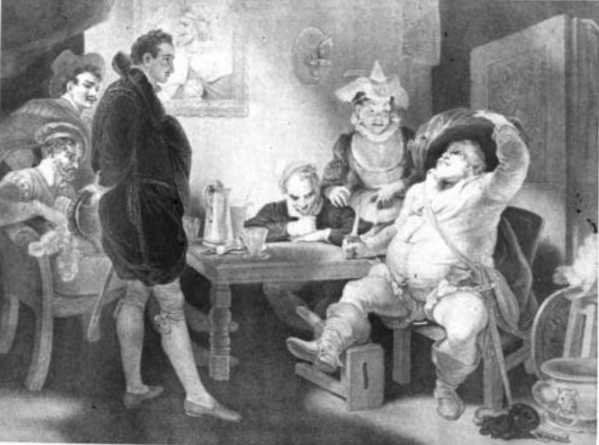I appreciate the way that David Brooks of The New York Times will periodically ground a column in a literary character. He did so last week when he imagined Shakespeare’s Prince Hal as an American school child. As Brooks sees it, the American educational system tends to favor those who are “nurturing, collaborative, disciplined, neat, studious, industrious and ambitious.” Hal, he argues, would have been one of those who don’t fit this cultural ideal and who under such a system might not have gone on to become the successful king that Shakespeare portrays.
Here’s the alternate trajectory that Brooks imagines for the young prince:
First, Henry would withdraw. He’d decide that the official school culture is for wimps and softies and he’d just disengage. In kindergarten, he’d wonder why he just couldn’t be good. By junior high, he’d lose interest in trying and his grades would plummet.
Then he’d rebel. If the official high school culture was über-nurturing, he’d be über-crude. If it valued cooperation and sensitivity, he’d devote his mental energies to violent video games and aggressive music. If college wanted him to be focused and tightly ambitious, he’d exile himself into a lewd and unsupervised laddie subculture. He’d have vague high ambitions but no realistic way to realize them. Day to day, he’d look completely adrift.
Others have made Brooks’s point that we are losing our boys because our school systems don’t take their special energy into account. I posted two years ago on Anne Applebaum of Slate talking about how Tom Sawyer today would be diagnosed with ADHD and medicated.
On the other hand, Hal’s rough and tumble adolescence also includes being accessory to a robbery, which might be a little much even for David Brooks. I say accessory because Hal knows of Falstaff’s plan to rob a group of pilgrims (a hanging offense) but makes no attempt to prevent it—he just uses the occasion to play his own joke on Falstaff and rob his fat friend in return. (I don’t recall any mention of Hal returning the money to the pilgrims.)
And then, is Brooks calling for our young men to be raised in taverns by dissolute old men? I acknowledge that there is a case to be made to providing young boys with male mentors. But Hal’s behavior actually sounds like that of a number of our high school dropouts so I’m not sure that it should be held up as a model.
In short, good for Brooks for bringing up Shakespeare, but I’m not sure that he is doing anything other than making a tired jeremiad against liberals and feminists who he believes have emasculated manly education.
Additional Note on Henry IV, Part I – Incidentally, when last I wrote about Shakespeare’s play, it was after talking with James Gomez, a Vietnam vet I encountered in Manhattan’s Union Square, about why he didn’t like Falstaff. I thought afterwards that maybe James’s dislike arose because Faustus was guilty of “stealing valor,” claiming to have killed the rebel Henry Percy when he didn’t. At the time we talked, the Supreme Court was judging the merits of U.S. vs. Alvarez, in which Alvarez argued that the law finding him guilty of a felony for having lied about military honors was unconsitututional.
There was a message from James waiting on my phone when I returned from California noting that the Supreme Court had found 6-3 in favor of Alvarez, agreeing (on First Amendment grounds) that such lying can’t be turned into a federal offense. As I argued in my post, I think Hal—who actually did kill Percy—would have agreed with the ruling. You don’t put someone in jail for being a blowhard, offensive though he may be.


